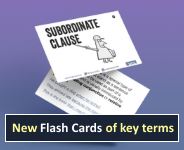Topic: Vocabulary
These resources relate to the nature of words and word choice, and move towards building student vocabularies in systematic ways.
Englicious contains many resources for English language in schools, but the vast majority of them require you to register and log in first. For more information, see What is Englicious?


